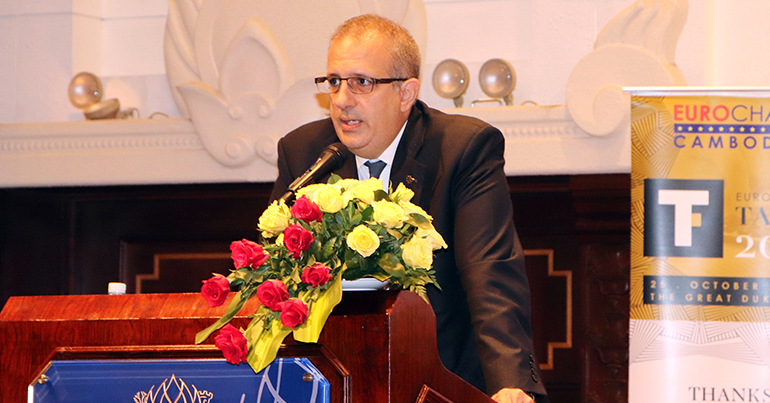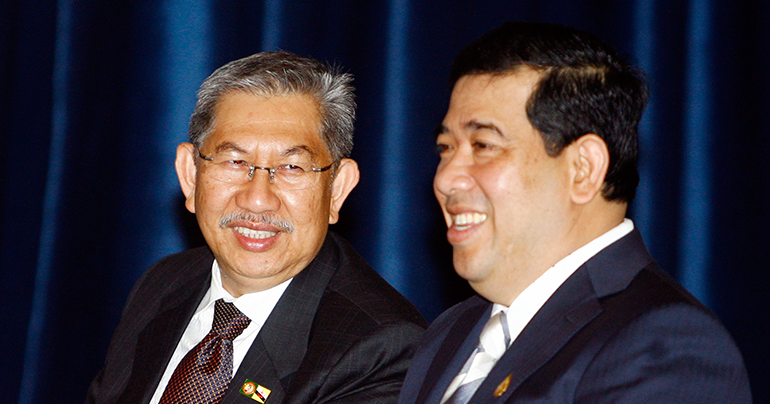During the fourth annual EuroCham Tax Forum yesterday, the group’s chairman lauded sweeping government efforts to enforce tax compliance among businesses across Cambodia, calling it a step towards the government’s goal of financial autonomy. But in the same breath, he called for grace on behalf of the business community

This year alone, Cambodian tax revenue has increased by 20% year-on-year, with a total of $1.7b collected from “an expanded pool of taxpayers” in the first ten months of the year, Eurocham Chairman Arnaud Darc said during his opening remarks at the Eurocham Tax Forum in Phnom Penh, lauding the government’s tax enforcement.
“Only a few years ago, it would have seemed ludicrous to talk about proper bookkeeping,” he said. Now, there is increasing engagement from both the government and the business community, he noted, pointing to the roughly 500 attendees at the forum – a new high for the business event’s attendance.
But even as new tax regulations and enforcements have increased compliance and government income, Darc said there were frustrations in the business community about how the Ministry of Economy and Finance’s General Department of Taxation (GDT) was approaching the task.
“We want to be compliant and we want our competitors to be compliant so that we can all compete in this market while contributing our share to the national development,” Darc said. “I would, however, fail my members and my colleagues from other business associations if I did not here add that, while we [have] decided to support more compliance, a growing number of companies remain distraught by the harsh treatment they face when they choose to come clean and enter the realm of the formal economy.”
In the process of properly registering to be tax compliant, Darc said, companies have been “hit by severe and backdated tax audits of sometimes up to 10 years.” Nearly 50% of tax revenue in Cambodia last year came from penalties and reassessments, which was dramatically higher than in other countries where the ratio was below 10%, Darc claimed.
Cambodian economist Can Sophal, director of the Centre for Policy Studies, told Southeast Asia Globe in March that the GDT had been practicing its legal right to back-taxing “a lot”, with some companies having to pay millions of dollars. For more than a year, these audits have hit businesses new and old. Commentators have referred to the GDT’s efforts as a revenue-raising spree.
While Darc said tax measures were important for the government to enforce, he suggested that the GDT offer tax incentives – rather than penalties – to businesses that agree to become tax compliant, such as clearing back taxes and offering future tax breaks.
But critics of the tax department have accused the GDT of using its power to demand back taxes to target entities seen as critical of the government. These include the high-profile shutdown of the Cambodia Daily newspaper after the publication was issued a disputed tax bill of $6.3 million, forcing it to fold despite its owner claiming the GDT refused an official audit. The Phnom Penh Post, which was sold earlier this year to a Malaysian public relations executive linked to the ruling party, was also issued a tax bill of $3.9 million – a bill that was settled out of court during the course of the sale.

Kong Vibol, head of the GDT, has said his department’s efforts were not meant to hurt the business community – but he’s given little indication that the GDT would curb its efforts.
“Every taxpayer is my partner, my business partner. Every single dollar you make, 20% is my share. So the more you make money, the happier I am,” he said. “I hear about your request… that some issues need to be improved, like, for example, modernisation of tax [processes and] the treatment of the taxpayers. We have to work together to bring those issues to a close.”
[manual_related_posts]
In an effort to address current wrinkles in the process and incentivise tax compliance, Vibol pointed out the prakas approved at the start of this month giving tax breaks to small and medium-size enterprises that follow certain bookkeeping and tax requirements. Additionally, he said, the GDT had 29 projects for 2019 – all ranked high priority and expected to span the entirety of the year, including a VAT refund system, a double tax avoidance system and an e-filing system that he said would help streamline the tax process for both the department and businesses.
Despite a sideline interview with local media after his speech in which Vibol hinted that tax audits might “not go back so many years” if companies agree to full compliance moving forward, the tax department head was firm in his commitment to expanding the government’s tax revenue.
“I don’t want you to see a lot of harsh treatment from our tax officers. I want to be Mr. Nice Guy also,” Vibol said. “[But] I don’t know what I can do, because I have to do my job.”
Cambodia
EuroCham chairman calls for gentler tax-compliance process
During the fourth annual EuroCham Tax Forum yesterday, the group’s chairman lauded sweeping government efforts to enforce tax compliance among businesses across Cambodia, calling it a step towards the government’s goal of financial autonomy. But in the same breath, he called for grace on behalf of the business community

